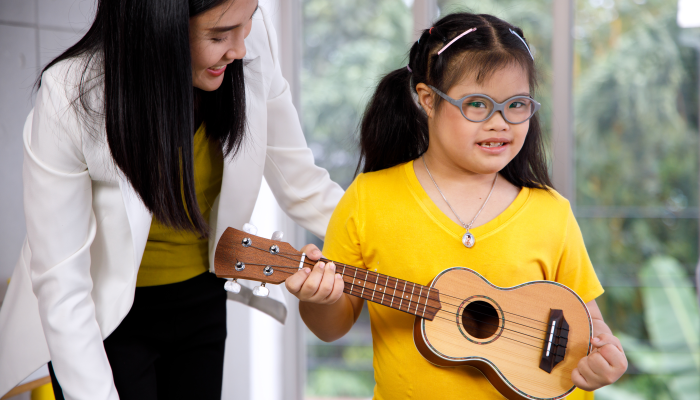Nursery Rhyme Hand Motions

This post may contain affiliate links; please see our terms of use for details.
Remember when you were a kid and you used to sing tons of songs? You knew all the words and hand motions that went with each song, didn’t you?
Then you grew up and had kids of your own and all those lyrics and signs just blew right out of your brain!
Simple nursery rhymes like Itsy Bitsy Spider or Wheels on the Bus are staples of childhood, and there’s a good reason for it, too. These songs help with memory and language comprehension; teach social skills as we all sing together; and aid in strengthening a child’s fine and gross motor muscles.
If your child is blind or visually impaired you may think that songs with hand motions are “too visual” for them, but there is so much more to these songs than what you can see with your eyes!
Think about all your child can learn just by moving their hands in rhythm with a song: they can connect with you as you teach them the signs hand over hand; they can learn basic turn taking skills; they may find themselves motivated to reach high above them as they do Twinkle Twinkle Little Star; or they might learn body awareness as they do Head, Shoulders, Knees, & Toes; plus they’ll have fun doing it because music always makes things more enjoyable!
So get yourself ready to play with your child and sing all those great songs from your own childhood by relearning the songs and movements. Below you’ll find videos for some of your favorite songs, like Itsy Bitsy Spider, Where is Thumbkin, and Wheels on the Bus.
The Wheels on the Bus is a song that gets the whole body moving: your arms swing in and out with the doors, your body jumps up and down with the people, and your hands move back and forth with the wipers. Ivan’s favorite part of the song is the babies who say, “Wah, wah, wah.” The hand motion used to do this is actually very difficult to master, so help your child ball their hand into a fist and rub their eyes. The twisting and turning of the wrist is a great fine motor activity, too.
Peanut Butter & Jelly is a great song to pair with the real thing. Pull out some peanut butter and jelly and bread so your child can touch the objects while you sing and sign about them.
This song includes a lot of grand motions way up high and way down low. This is a great song to sing with kids who don’t like to reach out too far from their bodies.
I love this song because it’s so easy to sing. Plus it’s a great song to help teach body awareness as your sticky hands get “stuck” to your head, nose, and shoulders.
Where is Thumbkin? is such a classic song and perfect for kids who don’t like to use their hands and fingers. Get your child to isolate each finger in the song so they’ll be more aware of their hands.

Related Posts

Music Play
5 Fun DIY Musical Instruments for Kids
Looking for a rainy day activity you can do on a budget? Get your little rock stars into these easy, crafty DIY musical instruments with stuff you have at home.

Autism, Music Play
6 Ways Music Therapy Can Support Children With Autism
By harnessing the power of music, autistic children can develop communication, social, emotional, cognitive, and motor skills. Here’s how!

Music Play
Music and Movement: Enhancing Preschool Learning Through Songs
Music and movement activities for preschoolers can help enhance their cognitive skills and brain development while developing social, emotional, and academic skills.